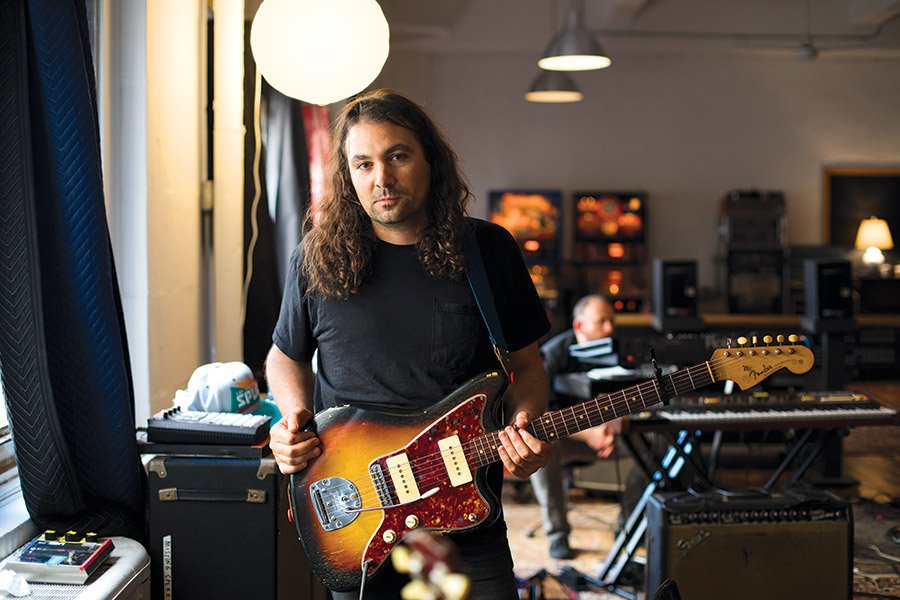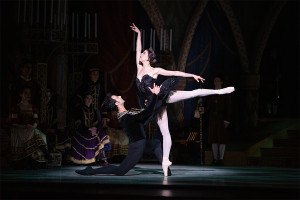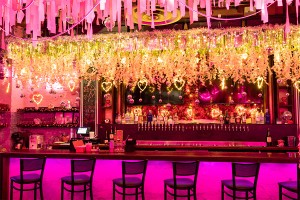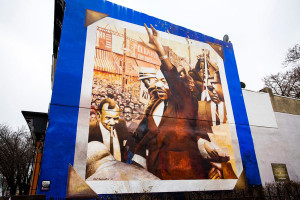The War on Drugs Is the Rock Band We Need Right Now
Rock-and-roll may have lost some of its cultural luster, but Adam Granduciel of the Grammy-winning Philly group hasn’t given up the fight.

Adam Granduciel inside the band’s rehearsal space at the Bok in South Philly. Photograph by Ryan Collerd
Adam Granduciel is shuffling around backstage at Late Night with Seth Meyers with a paper cup of coffee in his hands, not sure what to do with himself. He and the rest of his band, the War on Drugs, wrapped up their sound check and rehearsal about an hour ago. It’s another four hours till they play for real. If fellow guest Tiffany Haddish is here, she’s holed up in her green room. Meyers is at the hospital with his wife and their newborn son, who arrived just 24 hours ago in the lobby of their Manhattan apartment building. The host will turn up an hour before airtime and recount the harrowing, hilarious story in the show’s first segment, right after the monologue.
“Wanna see where they do Saturday Night Live?” Granduciel asks. He tucks a lock of his long, stringy hair behind his ear and leads the way. It’s just across a bank of elevators from Meyers’s set, on the eighth floor of 30 Rock. We wander in, past hand trucks loaded with props and furniture, and touch the stage. It’s the same set you’ve seen on TV a thousand times, but smaller than you’d expect and, under harsh overhead lights, a bit less grand. A few suits gathered in the seating area shoot us a look, or seem like they might. Granduciel, the War on Drugs lead singer, lyricist and guitarist, shoves his hands into the front pockets of his logo-less blue hoodie and leads a retreat back to the Meyers side.
I ask if he’d like to play SNL someday.
“Well, yeah,” he says.
Granduciel’s longtime publicist, Jessica Linker, chimes in that by her estimation, the honor is overdue.
It’s a tough point to argue with. After more than a decade in the trenches of the Philly music scene, the War on Drugs are finally in a position to dream bigger. They’ve got the sound, often drawing comparisons to Bruce Springsteen, Neil Young and Dire Straits. They’ve got the fans. They’ve got a deal with a major record label. And as of January, thanks to their most recent album, A Deeper Understanding, they’ve even got a Grammy.
They are, in other words, kinda sorta rock stars. Which raises the question: What does that even mean in 2018?
These days, when you win a Grammy for Best Rock Album, they don’t show it on TV. Your shining moment is relegated to web-stream status, so you don’t feel obligated to show up. Not if you don’t expect to win. And especially not if you’ve got a show booked on the other side of the world that day. The War on Drugs were in New Zealand in January when they learned they beat out Metallica, Queens of the Stone Age et al.
In April, the night before the band’s appearance on the Seth Meyers show, Adam Granduciel got to hold his Grammy for the first time. It was backstage at Brooklyn Steel, a sold-out 1,800-person-capacity rock warehouse the band had booked to warm up for several festival appearances (including Coachella in California, Primavera Sound in Barcelona, and the second night of WXPN’s XPoNential fest at the BB&T Pavilion in Camden this month).
“It was cool to see how excited everyone else was to hold it and see it,” says Granduciel, 39, whose parents were on hand in Brooklyn. He smiles. “I mean, I’m not gonna sit and pretend like I haven’t watched the Grammys every year growing up, regardless of who’s on.”
I wonder aloud whether the Grammys respect rock-and-roll right now, but he doesn’t take the bait. “Obviously, I would’ve loved to have been there,” he says. “There’s always been fluctuations in what is popular, what is commercial, or what is mainstream and what is kind of, like, in the moment.”
Granduciel points out that only nine of the Grammys’ 80-something award presentations were on the TV broadcast. Pop and hip-hop made the cut. Best Comedy Album and Best Country Album made the cut. But no rock.
How times have changed. Back in 1989, rising Philly hip-hop duo DJ Jazzy Jeff & the Fresh Prince were nominated for the first-ever Grammy for Best Rap Performance but boycotted the ceremony because the presentation wouldn’t be televised. (They ended up winning.) But that was about an underdog genre fighting for respect from the establishment. The popular opinion these days is that rock’s stock is on the decline and has been for a while. When did music critics start wringing their hands about how a new artist or band would “save rock-and-roll” — at the dawn of disco? The day Kurt Cobain died? It’s an old story.
“Rock has a branding issue. There’s still great rock music, but right now, popular music isn’t about music,” says Bruce Warren, program director at WXPN. “Rock needs a new ambassador. Rock needs a fucking Kendrick Lamar.”
Warren’s not calling Granduciel the savior of the genre, but he says he liked the War on Drugs from day one. “I saw the future of rock-and-roll in the very early days. I’m being very serious. … There was something about Adam — his energy, his guitar-playing, the band as it was coming together.”
Granduciel is sanguine about rock’s current status — or at least the Grammys’ cold-shouldering of the genre. “Maybe we would have [been asked to appear] 30 years ago. Probably not,” he shrugs. “Maybe in a year, we’ll be doing a duet with Bruno Mars or Kacey Musgraves or whoever.”
Would he be into it? “I don’t know. ‘Would they be into it?’ is more the question.”
Granduciel — born Adam Granofsky — grew up in small-town Massachusetts. After studying fine arts at Dickinson College in Carlisle, Pennsylvania, he moved first to Oakland and then, in 2003, to Philadelphia. Before long, he’d become a figure in the local music scene; he put in a stint in well-regarded indie band the Capitol Years and collaborated with fellow Philly guitar hero Kurt Vile. He and Vile played in each other’s bands before going their separate ways in a divide-and-conquer maneuver.
Granduciel was living in a narrow South Kensington trinity in the shadow of the Market-Frankford El the last time I interviewed him. It was March of 2014. He had a cat named Bobby Jean and a roommate or two. His living room was his recording studio and home office, full of guitars and amps and boxes of the band’s then-brand-new third record, Lost in the Dream. The place was a bit run-down. The Tom Petty poster on the wall might have been load-bearing.
He was, at that moment, an artist on the verge, as prognosticating rock critics like to say. Despite frequent lineup changes in those early years, the War on Drugs had built a solid reputation for blue-collar live shows. They worked day jobs. They performed at small clubs in Fishtown like Johnny Brenda’s and Kung Fu Necktie. They toured the country by van as often as they could.
Their first two full-length albums, released in 2008 and 2011 on an indie label, had been well received. There was a sense that Lost in the Dream would take the band to new heights. As for Granduciel, he was just on the other side of a dark period in his life back then. The record hadn’t come easy.
Every song had been written and rewritten, recorded and re-recorded. He was struggling to achieve a sound just out of reach, something classic and daring and artful at the same time. His laptop was loaded with dozens, maybe hundreds of versions of songs, each one a tweaked iteration of the one before it. If he’d been a sculptor, he joked back then, “I’d probably end up with, like, a pebble.”
The track listing on the back of Lost in the Dream is a window into what he’d been going through: “Under the Pressure.” “Red Eyes.” “Suffering.”
Granduciel’s obsessiveness is always part of the War on Drugs story. Somewhere there’s a picture of him and his bandmates in front of the Late Show with David Letterman marquee in 2014, and everybody’s smiling but him. The reason? He’d hit a “weird note” during their performance. It’s the kind of thing only he would notice, but he beat himself up over it. Today he shakes his head at the memory: “I look at that photo and I’m just like, ‘Man, what an asshole. Just fucking enjoy it.’”
All that early sweat and stress, all those lean years, long van rides and tours that somehow lost money, finally paid off when Lost in the Dream came out. The positive reviews started rolling in. “Red Eyes,” with its catchy beat and memorable guitar hook, became a low-key hit, and the band was soon performing on every talk show that would have them. Granduciel sent Bobby Jean to live with his mom so he and the band could hit the road hard, headlining shows across the country and elsewhere: Iceland, Australia, Luxembourg, you name it.
Lost in the Dream went on to dominate the year-end album lists, and Atlantic Records came calling.
Last year, after 14 years in Philly, Granduciel moved to Los Angeles to live with his girlfriend, actress/singer/author Krysten Ritter, perhaps best known as the star of Netflix’s Jessica Jones. When it came time to work on a follow-up, he flew his bandmates in from Philadelphia, sometimes for a week or a month at a time, for extended jamming and recording sessions.
“On one hand, I miss having him in Philly. For so many years he lived, like, five blocks from me in Fishtown,” says bassist Dave Hartley, who also records music under the name Nightlands. “But having him so close, I think, led to a recording environment maybe a little too relaxed, where he would just text me and be like, ‘Hey man, I’m working on a new song. Come over and play a bass part?’” He laughs at the memory. “I’d, like, take a pass at bass and then we would go get a beer. Then that bass is what would end up being on the fucking record.”
This time around, there would be a more professional attitude. They got together (mostly in L.A., with additional sessions added in New York) and got to work.
“Those were really special times, actually, as this record was coming together, to kind of go out there and really just focus on music and nothing else,” says drummer Charlie Hall, who also leads a 17-member choir called the Silver Ages. “In a way, there’s no distractions. I mean, of course there’s the distraction of Los Angeles in general, but we were out there for just one singular reason.”
All that jamming led to A Deeper Understanding, which peaked in the 10th spot on Billboard’s album sales chart. With that came more touring (by bus instead of van), more TV appearances, and, eventually, that Grammy.
Compared to most rock-and-roll success stories, the War on Drugs found their audience relatively late. All the band members are in their 30s and 40s, a fact they say has contributed to their level-headedness and lack of entitlement. Granduciel conjures up the famous swimming-pool scene from the 1988 documentary The Decline of Western Civilization Part II — Chris Holmes of the metal band W.A.S.P. adrift on an inflatable chair, guzzling vodka and talking about how much he hates himself — and then contrasts it with his own home life.
He used to talk about stress and anxiety. Now he describes a blissful West Coast existence: getting up early to play the piano for hours on end, cooking, doing hot yoga. In short: He’s figured out how to fucking enjoy it.
The War on Drugs are still a Philly band, in a sense. Three of the six members live here. They keep a practice space in the Bok building, the former public school in South Philadelphia with art studios in the classrooms and a fair-weather beer garden on the roof. Whenever the band’s on a break, Hall and Hartley and keyboardist Robbie Bennett like to hang out there, sometimes to jam and sometimes to play pinball. Then they go home to their wives, pets and kids.
“If I’m not rehearsing or working on music, I’ll be trying to just take care of anything that I can while I’m around. House and life stuff,” says Hall. “Trying to earn my keep.”
Hartley echoes the sentiment. “I’m almost embarrassed when my aunt or somebody says, ‘You’re such a rock star.’ I’m like, ‘I’m really not. You have no idea how much I’m not.’”
That’s a tough sell after the War on Drugs show at Brooklyn Steel the night before, what with the cheering and the laughter at band banter and a couple weirdos shouting “I love you!” Craig Finn of the Hold Steady joined them on a Warren Zevon cover. Just about every song had a solo, and all eyes were on Granduciel — center-stage, arched over his guitar, bathed in spotlights and smoke-machine smoke.
At the moment, the War on Drugs is six people strong. Throw in another eight crew members (working lights, tuning guitars, etc.) and what you’ve got is a much larger operation than could fit into Kung Fu Necktie. Does Granduciel feel like a small-business owner? “Yeah, in some way. I feel like one of the guys, but I know there’s probably — I mean, who doesn’t get off on Friday and talk shit about their boss? I did the same thing. That’s part of what it means to have a job. But we’ve definitely curated a pretty great group of people. And at the same time, I enjoy kind of having it be more my thing.”
As for being a rock star, Granduciel, as you might expect, isn’t too comfortable with the term. He rarely gets recognized on the street, he says. He’s turned up in the tabloids, but always in the boyfriend role. And yeah, on this night inside 30 Rock, he’s about to play a Flying V guitar on national television, wearing the same Bob Dylan t-shirt he wore onstage at Brooklyn Steel the night before. But that’s just life for a regular hardworking dude in a band.
Published as “Fortunes of War” in the July 2018 issue of Philadelphia magazine.


